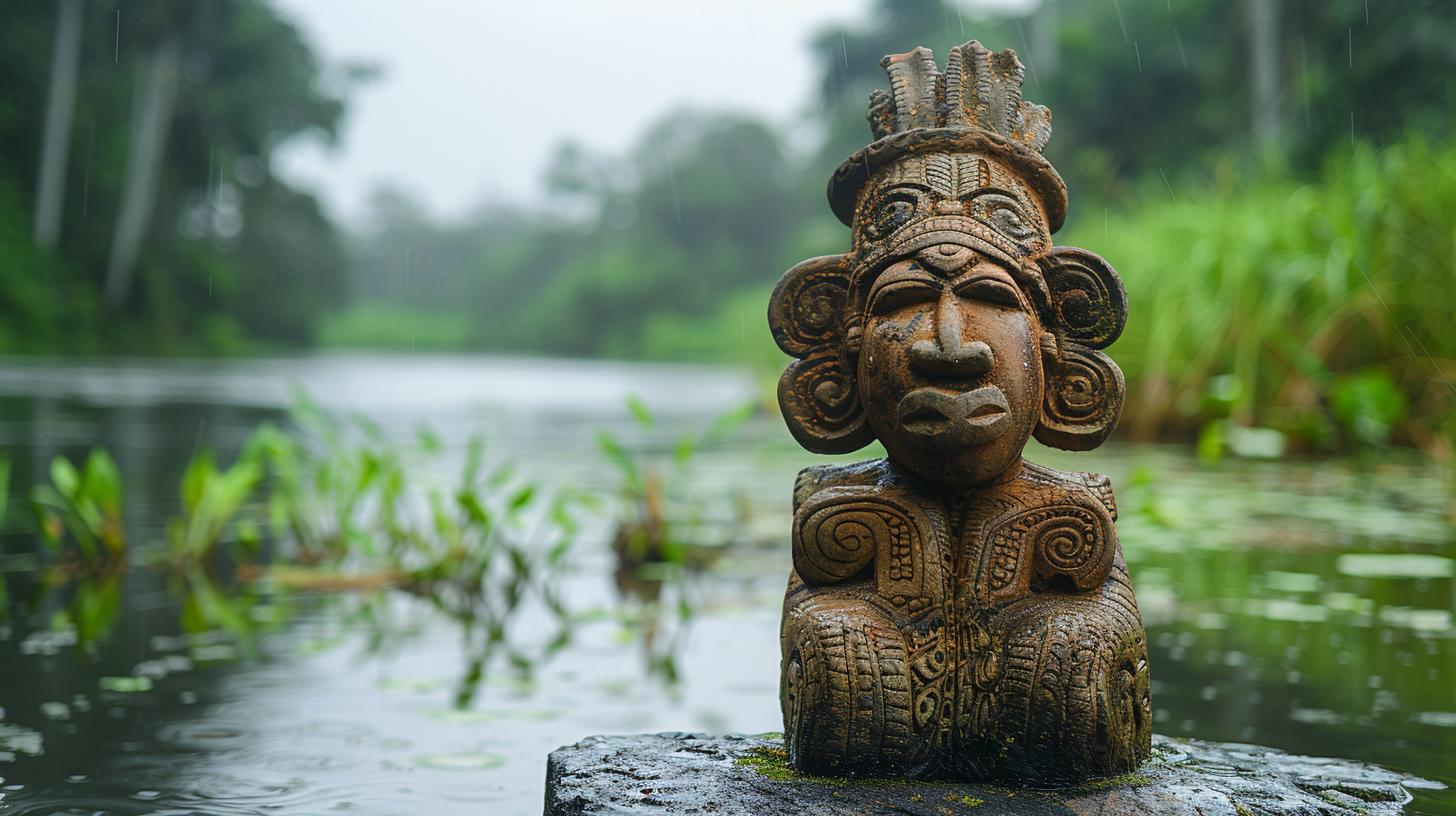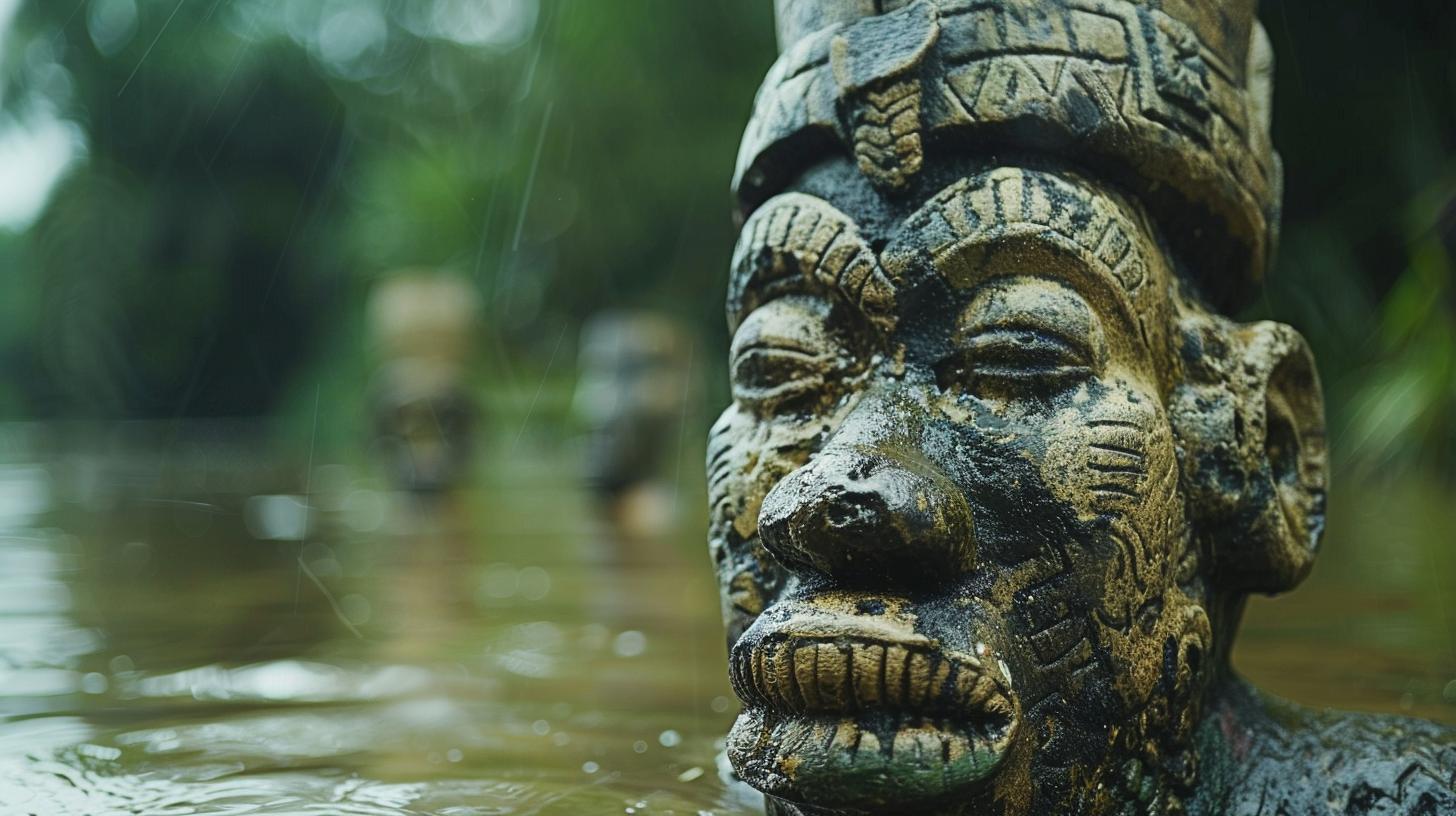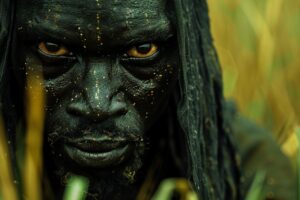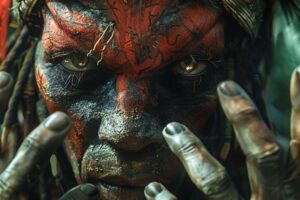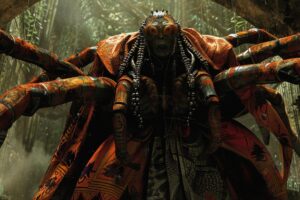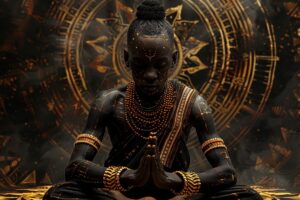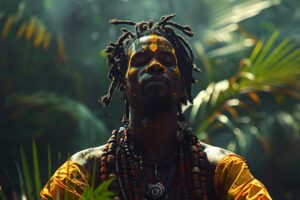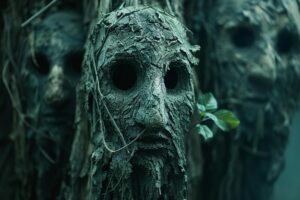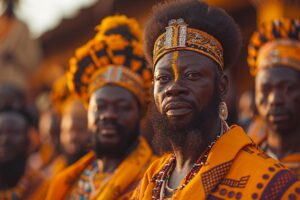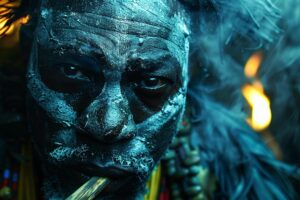Tano River God: A Powerful Deity in Akan Mythology
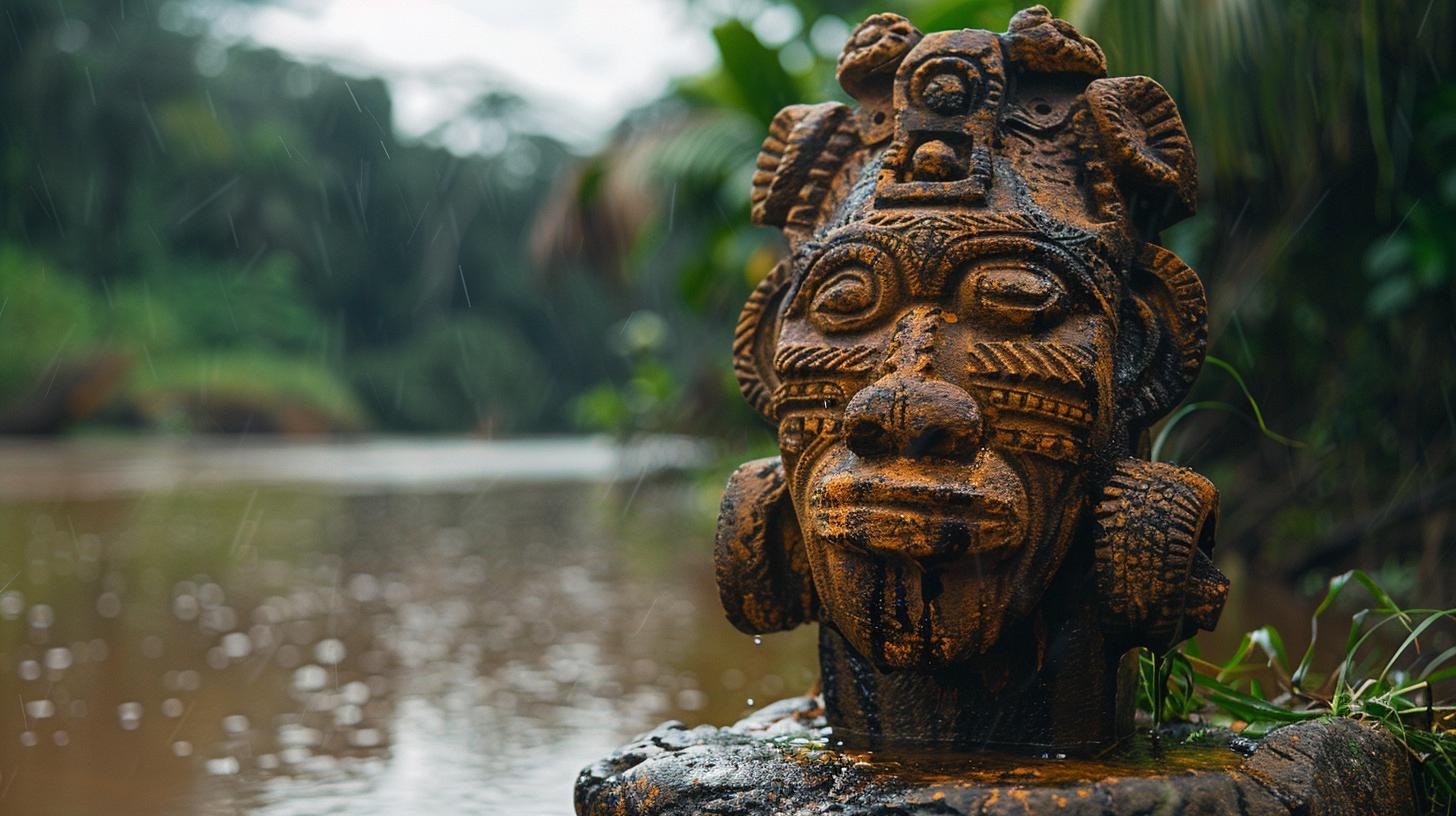
The Tano River God, known as Tano Akora, is a prominent figure in Akan mythology. Representing the Tano River in Ghana, Tano Akora is highly revered as the god of war and thunder among the Akan people.
His appearance is that of a strong warrior armed with traditional Ashanti weapons, such as a spear and a bow. Tano Akora’s complex character and divine abilities have long been celebrated in Akan culture and worship.
Overview of Akan Mythology
Akan mythology is a rich and diverse tradition that holds deep cultural significance for the Akan people of Ghana and the Ivory Coast. The stories, beliefs, and rituals within Akan mythology provide a unique insight into the spiritual world of this West African culture.
In this section, we will explore the introduction to Akan mythology, the significance of river gods in Akan mythology, and delve into a brief history of the Akan people.
Introduction to Akan Mythology
The Akan people have a long and complex tradition of storytelling and spiritual beliefs that form the basis of their mythology.
These myths encompass a wide range of themes, from creation stories to tales of gods and heroes that shape the Akan worldview. Through oral tradition and cultural practices, Akan mythology has been passed down through generations, reflecting the values and beliefs of the Akan society.
Significance of River Gods in Akan Mythology
River gods play a crucial role in Akan mythology, symbolizing the power and life-giving properties of rivers in the natural world. These deities are often revered and worshipped for their ability to provide sustenance, fertility, and protection to the communities that reside along their shores.
The relationship between the Akan people and river gods highlights the interconnectedness of spiritual beliefs and environmental forces within Akan culture.
Brief History of Akan People
The history of the Akan people is a tapestry of migrations, cultural exchanges, and interactions that have shaped their identity over centuries. Originating from the Sahel region of West Africa, the Akan people migrated southwards and settled in the forested areas of present-day Ghana.
Their history is characterized by the rise of powerful kingdoms, such as the Ashanti Empire, which played a significant role in shaping Akan culture and traditions.
Tano River God in Akan Mythology
The Tano River God, Tano Akora, holds a significant place within Akan mythology, embodying various attributes and powers that reflect the complex beliefs and values of the Akan people.
This deity’s origins and interactions with other Akan deities provide a rich tapestry of lore and symbolism.
Origins and Meaning of Tano Akora
- Tano Akora’s origins are shrouded in myth and legend, tracing back to ancient Akan cosmology and the primordial forces that shaped their worldview.
- The name ‘Tano Akora’ carries deep symbolic meanings, reflecting the deity’s role as a guardian of the river and a powerful force in the natural world.
- Legends surrounding Tano Akora’s creation highlight his divine nature and the respect the Akan people hold for the river god.
Attributes and Powers of Tano Akora
- Tano Akora is depicted as a formidable warrior deity, wielding traditional Ashanti weapons and possessing the ability to shape-shift and spread diseases among enemies.
- His connection to warfare and thunder underscores his role as a protector of the Akan people and a symbol of strength and resilience.
- The diverse array of powers attributed to Tano Akora showcases his multifaceted nature and influence within Akan mythology.
Relationship with Other Akan Deities
- Within the pantheon of Akan deities, Tano Akora maintains close ties with other divine beings such as Bia, Bosomtwe, Anansi, and Apo, each contributing to the intricate web of spiritual beliefs.
- His interactions with Owuo, the god of death, and other deities shape his character and emphasize his role as a hero and merciful figure in Akan mythology.
- The dynamic relationships between Tano Akora and his divine counterparts add depth and complexity to the mythological landscape of the Akan people.
Tano Akora’s Role as a War Deity
The role of Tano Akora as a war deity is deeply rooted in Akan mythology, encompassing various aspects of warfare and battle.
War and Battle Associations of Tano Akora
Tano Akora is revered for his associations with war and battle. In Akan culture, he is depicted as a formidable warrior who embodies strength and valor in the face of conflict.
Weapons and Abilities of Tano Akora
Armed with traditional Ashanti weapons such as an Akrafena, a spear, a bow, and a pistol known as ‘Kodiawuo,’ Tano Akora possesses formidable abilities in battle. His prowess and strategic tactics have been the subject of admiration and reverence among his devotees.
Stories and Legends of Tano River God in Warfare
Throughout Akan mythology, stories and legends recount the feats of Tano Akora in warfare. His cunning tactics and divine interventions in battles have solidified his reputation as a powerful warrior deity among the Akan people.
Tano Akora as a Nature Deity
Tano Akora, the Tano River God in Akan mythology, is not only revered as a god of war but also holds a significant connection to the forces of nature. This aspect of his deity encompasses his relationship with thunder and lightning, as well as various symbolic animal representations that hold deep meaning in Akan culture.
Connection to Thunder and Lightning
In Akan mythology, Tano Akora is closely associated with the powerful forces of thunder and lightning, representing his authority over the skies and the natural world. Thunder is believed to be the sound of his anger and power, while lightning signifies his swift and forceful actions.
The Akan people view the presence of thunder and lightning in nature as manifestations of Tano Akora’s divine energy and influence.
Symbolic Animal Representations of Tano Akora
Various animals hold symbolic significance in the representation of Tano Akora as a nature deity. Baboons symbolize his strength and agility in battle, while fish represent his ability to navigate the waters of the Tano River with ease.
Crocodiles embody his fierce and protective nature, elephants symbolize his immense power, and goats reflect his sacrificial and merciful attributes. These animal representations serve as sacred symbols of Tano Akora’s connection to the natural world and his role as a deity of the earth.
Rituals and Festivals in Honor of Tano Akora
Rituals and festivals play a significant role in honoring Tano Akora in Akan mythology. These ceremonies are deeply rooted in tradition and spirituality, highlighting the reverence for the Tano River God in Akan culture.
Ceremonies at the River Tano
Ceremonies at the River Tano are central to the worship of Tano Akora. Devotees gather along the riverbanks to perform sacred rites and offerings in homage to the powerful deity. The flowing waters of the Tano River symbolize purification and renewal, enhancing the spiritual connection with Tano Akora.
Sacred Shrines and Places of Worship
Throughout Akan lands, sacred shrines dedicated to Tano Akora serve as focal points for worship and pilgrimage. These shrines, such as the Tano Rock shrine and the Tano Abenamu shrine, are adorned with symbols and relics that embody the essence of the Tano River God.
They provide a sacred space for devotees to commune with Tano Akora and seek his blessings.
Practices and Devotions to Tano Akora
- Devotees engage in various practices to honor Tano Akora, including prayers, chants, and rituals performed with reverence and devotion.
- Offerings of food, drink, and symbolic items are presented to Tano Akora as tokens of gratitude and supplication.
- Music and dance are integral components of ceremonies dedicated to Tano Akora, invoking his presence and favor through rhythmic performances.
- Priests and priestesses lead the ceremonies with solemnity and spiritual guidance, channeling the energy and essence of Tano Akora for the benefit of the community.
Legacy and Influence of Tano Akora
Exploring the enduring legacy of Tano Akora reveals a rich tapestry of cultural evolution and spiritual significance in Akan mythology.
The worship of Tano Akora has transitioned through time, shaping modern practices and beliefs.
Evolution of Tano Akora’s Worship
The evolution of Tano Akora’s worship reflects the dynamic nature of Akan spirituality. From ancient rites to contemporary ceremonies, the veneration of Tano Akora has adapted to changing societal norms while preserving traditional values.
Tano Akora’s Contemporary Relevance
Tano Akora continues to hold a prominent place in Akan culture, resonating with followers seeking guidance, protection, and strength. His influence extends beyond myth, inspiring individuals to embrace courage and resilience in the face of challenges.
Stories of Tano Akora in Modern Akan Culture
- Legends and tales of Tano Akora persist in modern Akan storytelling, recounting his heroic deeds and divine interventions. These narratives serve as a testament to the enduring power of Tano Akora’s legacy.
- Contemporary artists, writers, and performers draw inspiration from Tano Akora’s stories, incorporating his essence into various forms of creative expression.
Through art and literature, the spirit of Tano Akora is kept alive for future generations.
- From children’s books to theatrical productions, Tano Akora’s mythological adventures captivate audiences and instill a sense of cultural pride.
His stories transcend time, bridging past and present with lessons of valor and compassion.
.

